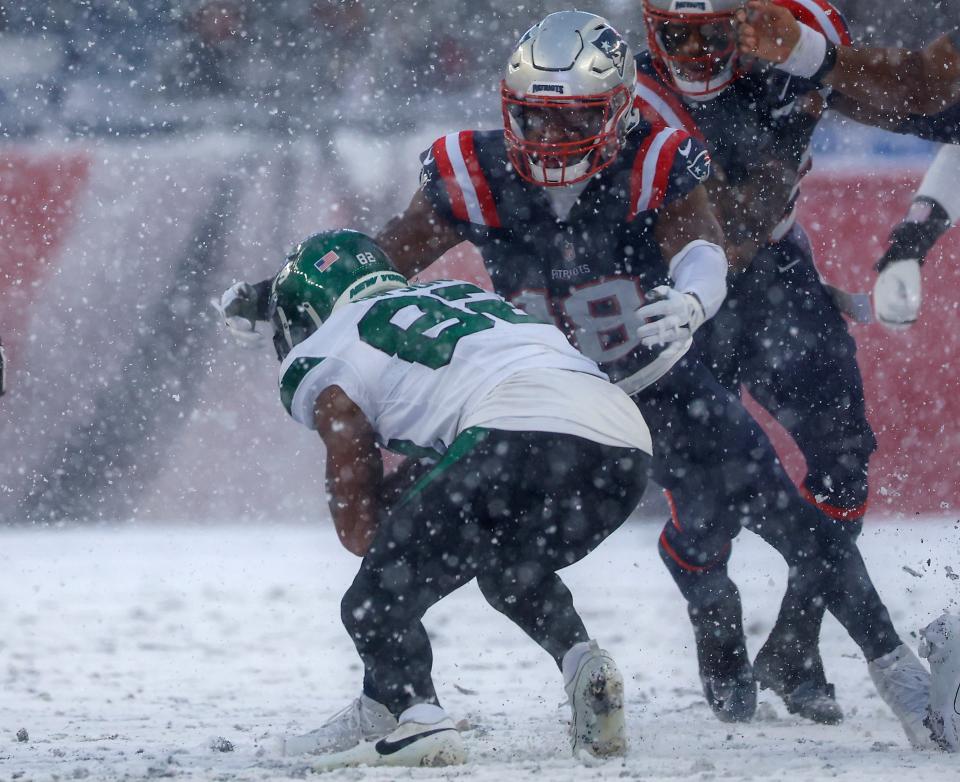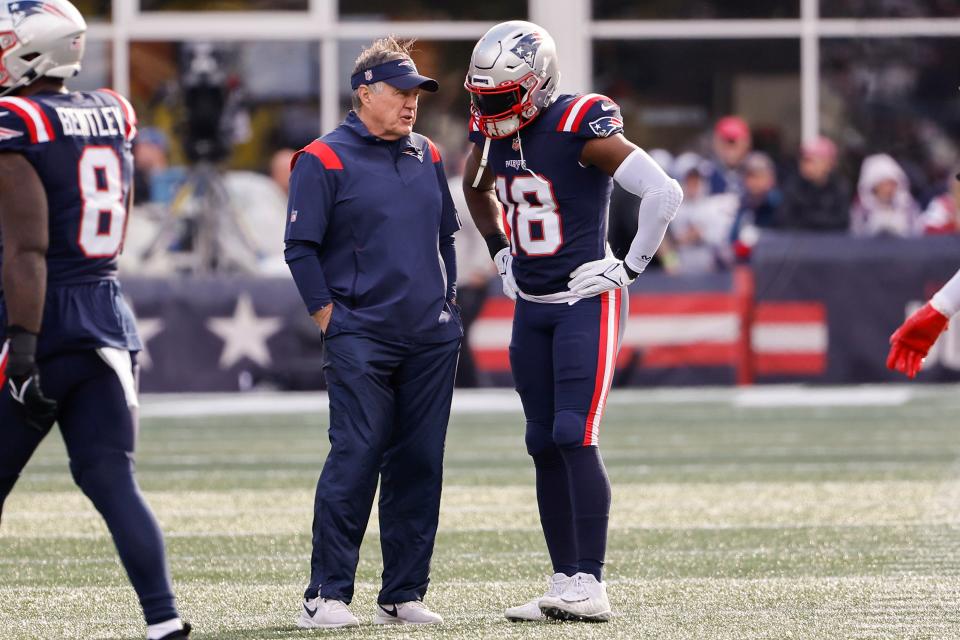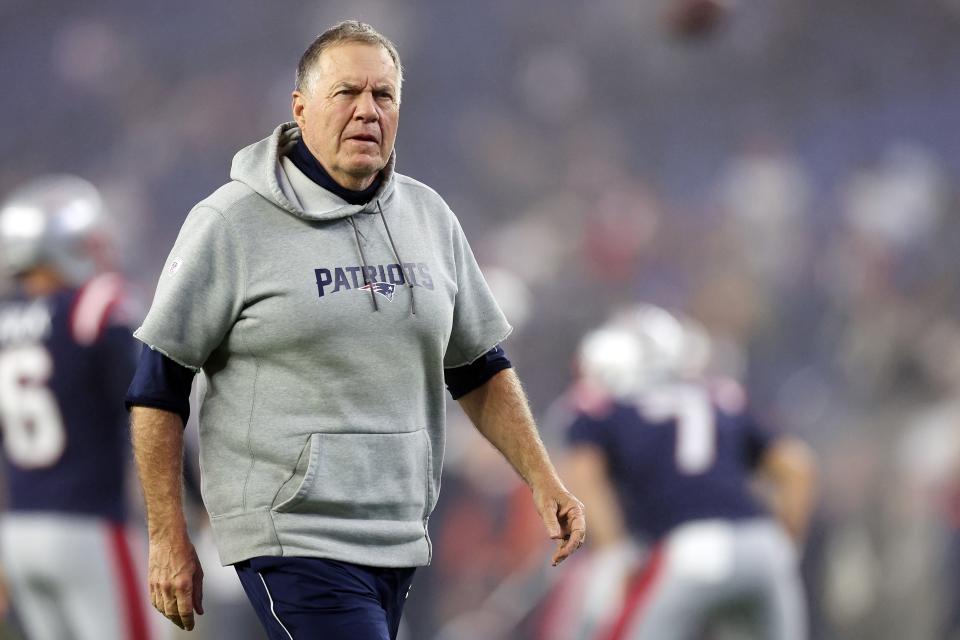An Exit Interview With Matthew Slater, the True Keeper of the Patriot Way

There’s a lot of buzz around the New England Patriots’ dynasty right now, thanks to the new Apple TV documentary that tells the story of their 20 years of dominance. The main figures—Tom Brady, Bill Belichick, Robert Kraft—are well-known to football fans. But, another instrumental player was much less heralded, but still critical to the team’s overwhelming success.
Matthew Slater technically played wide receiver for the Patriots, but he hardly ever touched the ball, or even entered the game on offense. Instead, he made his living on special teams. Not only that: he made his living on special teams as a guy who rarely touched the ball even there, making him an even more anonymous member of an already anonymous group. Covering punts and blocking on kick returns is not anyone’s idea of a glamorous job. But Slater was arguably the best of his generation at it, making 10 Pro Bowls, two All-Pro teams, and winning three Super Bowls while doing it. In the process, he earned a reputation as one of the famously curmudgeonly Belichick’s favorite players of all time.
The king of special teams officially announced his retirement in February, joining Brady and Belichick as yet another pillar of the Patriots dynasty that has moved on to other things. Slater sat down with GQ to go through everything he’s seen and done—from getting drafted in the fifth round despite not having a single catch in college, to correctly calling two crucial coin flips in the playoffs—in a career that, fittingly, you could only call special.
Even when you were in college at UCLA, your impact was felt mostly on special teams. As a receiver who didn’t ever catch the ball, did you ever expect to get drafted?
No! Based on how my UCLA career had gone, I didn’t expect to get drafted at all. I was hopeful about maybe being able to get into a camp, but I knew from the start that I was going to have to play special teams if I did get that opportunity. When the Patriots called on draft day, we were surprised just like everybody else.
Were there specific conversations at UCLA about how playing special teams could improve your chances of being drafted, or was that just how your playing time naturally shook out?
It just started for me as a way to get on the field and contribute. I had a couple of coaches—Dino Babers and DeWayne Walker—who I remember saying, “Hey, if you do this well enough, you might have a chance to play in the NFL.” I didn’t really think much of it at the time. Alright, that sounds great, I just want to play now! I couldn’t allow myself to think about the future. Little did I know what would be in store for me. Man, what a strange beginning to a fantastic ride.
Were you lobbying for something, anything? Hey, let’s see if we can get me just one touch per game?
Yes, absolutely! I probably did it in a very annoying way. I was always in the coaches’ offices asking what I needed to do to get on the field. I made a position change in the middle of college. I didn’t play it very much, but my last two years there I was a defensive back. I was just trying anything that I could, because I love football and I wanted to play!
One thing that people always talk about with you is leadership. That can obviously be a very difficult thing to quantify, so I’m wondering: from your perspective, what does that quality look like to you?
That’s a great question. As a man of faith, I think leadership is about servanthood. You want to serve the people around you as best as you can. There’s so many things written about leadership, there’s TikToks, on and on and on. For me, I always try to initiate my leadership style with relationships and meet people where they are. Hear their story, hear their why, and help them along their journey toward becoming the best version of themselves.
I knew that leadership was going to look different for me than it would for Tom Brady or Jerod Mayo or those guys. I had to do it in an authentic way. It takes a lot of intentionality. You know, there is more turnover on special teams, oftentimes within the season. There’s constantly new guys in there. You might be lining up next to someone who’s been there for two days. So, it does take a lot of intentionality to engage with those relationships and let guys know that you care about them. I think guys need to know that before you can ask them to do anything.

New York Jets (17) Vs. New England Patriots (3) At Gillette Stadium
What do you think it is about your brain or the way you see the world that allowed you to excel on special teams?
I give a lot of credit to my dad [Hall of Famer Jackie Slater]. I’m an offensive lineman's son! So, I was raised with the mentality of putting the team first and working hard for the guys around you. Another thing he instilled in me was respecting the game. No matter what you’re doing as it pertains to football, you have to respect it. I never wanted to take anything for granted or disrespect my opportunity. I think that kind of instilled a drive in me. I always felt like the most blessed guy on the team. I had a job! I was able to play a game that I loved! If that meant covering kicks or blocking for returners, I was more than happy to do it.
Did you start to feel like the proud papa of the special teams unit?
[laughing] It was always great to see young guys come in and have success. Hey, I can have a role on this team, and it’s important. Let me buy into that. When you see that lightbulb go off, you’re like, “Yes, this is fantastic!” Even if it was other guys around the league—I’m a huge fan of football, so to see anyone excel on special teams was awesome—that was the beauty of playing for as long as I did. I got to see things come full circle.
One guy that comes to mind right away is [Patriots cornerback] Jonathan Jones. He was an undrafted free agent out of Auburn, and all he did was play special teams his rookie year. He really embraced that role. He didn’t say much, he just came in and worked hard, played every play like it was his last. Now you fast forward nine years later and he’s one of the best slot corners in the league. He’s been a starter for us, he’s been a reliable player, and if you still want to throw him out there on special teams he’s happy to do it! It’s great to see those guys get rewarded. Julian Edelman, a lot of people forget the fact that he started his career on special teams. There’s a lot of instances of guys—J.C. Jackson was our fifth corner and he did whatever they asked him to do—leveraging that opportunity into bigger roles.
There’s a lot of talk about player safety when it comes to the kickoff, and what the kickoff’s place is in the modern game. Where do you stand on that?
I’ll say this. There are a number of guys who have made a career out of playing in the kicking game. I, obviously, feel very passionate about protecting the kickoff. It’s part of the fabric of our game. We need to do everything we can to preserve it. I don’t want to turn a blind eye to player safety. That is paramount at the end of the day. Nobody understands that better than the men playing the game. We also understand the inherent risk, and we’re saying we’re okay with those risks.
I certainly hope that the league, the coaches, the players’ union do everything within their power to preserve this play. I really think you’re changing football when you start tinkering with plays that have been around ever since all of us can remember. Let’s make it exciting again, not just have guys fair catching and taking touchbacks. You look at a guy like Devin Hester, he changed the game! And he’s now a Hall of Famer. You take away him returning kickoffs, and we’re not having that conversation. That’s my pitch. I’m selling that to anybody who will listen!
With all the team success that you enjoyed, there’s a lot of hate that comes with that as well. People really don’t like the Patriots! As a more anonymous member of the team, what was that like for you? Did you get recognized much at all?
You know, that was the beauty of it. I enjoy anonymity, so I didn’t really have too many of those instances, which was great. But it was weird! For the longest time, I was the fan that didn’t like those teams that win all the time. Then, all of a sudden, you’re on one of those teams that wins all the time! That was a little strange. I’d always think, Man, if the [opposing] fans knew these guys, they’d know they were great guys and they wouldn’t hate on them. We were very fortunate to have the level of success that we did, and that just comes with it.
Do you feel like the inherent selflessness needed to play on special teams also extends to your real life?
I like to think so! I think my parents did their best to raise my brother and I to think of others first and stay humble. That gave me a good disposition to embrace the role that I had. I’ve never been a look at me. I just go quietly about my business and hopefully make things better in any arena that I’m in.
That’s a very Belichick-ian philosophy.
Oh, absolutely. I’m convinced that without Coach Belichick and his tutelage, I never would have played for as long as I did or had half the success that I did. That was really a godsend. I was put in the perfect situation with a perfect coach who taught a philosophy that I really embraced.

Miami Dolphins v New England Patriots
When you talked to players from other teams, how quickly did you realize that they weren’t taking special teams as seriously as Belichick does?
[smirking] Yeah, there’s a lot of teams like that. Talking to players and coaches from other teams, they’d say, “We wish we had more roster spots for guys like you” and “We wish we could actually build some continuity within our [special teams] group.” A lot of coaches have different philosophies and are looking for the next best receiver or the next best defensive back. Coach [Belichick] was looking at the entirety of the game and how he could win a game in all three phases. He wanted the best players for each and every role, that’s the unique thing about him.
When young guys got to the Patriots and were put on special teams, could you tell when they didn’t want to be there?
Certainly. I’d say it was about 70-30. Most of the guys understood that it was part of our culture, understood its importance, and bought in. But there’s always going to be guys that are like, “Man, I’ve never done this. I really want to start on offense or defense.” That leads to a bigger pay day. You have to pull those guys in a little bit and make them see the importance of what we’re doing. By and large, the guys that came into our culture appreciated what it meant.
The other thing is, Belichick would play starters on special teams. It was powerful for guys to see. When I got to the team, Mike Vrabel, Tedy Bruschi, Rodney Harrison, these guys played on special teams! They were some of the best players not only on our team, but in the entire league. I think my third year was when I really gained a lot of confidence. My first couple years in the NFL were nothing to write home about. I had some struggles adjusting to the speed of the game.
What’s your favorite special teams play? I’m a sucker for a downed punt inside the five-yard line.
I’m with you on that. One of the coolest plays we had was, I think 2018, we were in Pittsburgh. We downed a punt where two guys—Jonathan Jones and Rex Burkhead—had to fully extend to tip the ball in the air. It was a cool play, and the only time I’d seen a play like that in 16 years. It takes a lot of work, practice, and coordination. You’re working with the punter to understand what type of punt he’s going to hit and where he’s trying to drop it, you’re dealing with the blockers, and you also have to be able to see whether the returner is going to catch it and return it, or come try and take your head off! As a gunner, you’re taking so many things into consideration as you’re trying to execute that play. I think guys make it look easy, but it’s a challenging play, and it’s such a momentum boost. When you pin a team inside the five-yard line, it’s hard to drive 95 yards on any defense in this league.
That feels like kind of the whole thing with special teams. People assume it’s easy or a place for guys who couldn’t hack it on offense or defense.
It’s funny you say that. My dad played 20 years in the NFL. We joke around, because he’ll say “I used to think you could find anybody off the street to do your job!” But the guys on special teams are some of the best athletes on the team. They’re some of the fastest, strongest, rarest physical specimens.
The longtime Patriots coach, now a free agent, seemed to suggest that he worked too hard to care about clothes. His hoodies suggested otherwise.
Was it hard for you to find role models or guys that you could emulate? Special teams stars don’t exactly have YouTube highlight reels.
When I came into the league, I had familiarity with the history of the game. [Bills legend] Steve Tasker and [Cowboys special teamer] Bill Bates were a couple of the guys I looked to as examples. Guys who were currently in the league like [three-time Pro Bowlers] Kassim Osgood and Brendon Ayanbadejo. They were the role models. These are guys that not a lot of people know about, but within our little special teams culture, we knew these guys well.
In the offseason, our special teams coach Scott O’Brien would make us sit down and just watch a cut-up of these guys. Their tackles, their most physical plays, how they blocked in the return game. He’d challenge me to play like them, especially Kassim.
Give me your Mt. Rushmore of special teams, any position.
Obviously, you have to put the godfather, Steve Tasker. What he did for the game and the position, he really revolutionized it. I think you gotta put Bill Bates up there. Then I’ll go with two modern era guys. I’m a really big fan of Michael Thomas, who played in Miami for a long time and was in Cincinnati for the last few years. He’s one of my favorite guys all-time. Then Lorenzo Alexander, a big linebacker who played 13 years in the league. There’s so many guys that it’s hard for me to pick a Mt. Rushmore. I’m a fan of so many guys, past and present, who paved the way for what we do.
We have to talk about your one NFL catch. Do you remember the play call on that?
I remember during the week, our offensive coordinator, Bill O’Brien, told me that there might be a chance to use my speed and get me on a vertical route down the field. This was the first game of the season! There’s a lot of excitement coming out of training camp and they were figuring out how to get everyone involved in the first game. What I appreciated more than anything was how excited Tom [Brady] was. Get Slate in there and we’ll throw one up! It was X Post, I can’t remember the full play call. But in the back of my mind, I’m thinking, They’re not really going to call this. We practiced it all week, but in a game you go with your bread and butter.
It may have been the first series of the game, and they called the play. I didn’t even have time to think about what was happening. I don’t even remember hearing the play call, because I knew I was only in the game for one reason: run fast! That’s what I’ve been doing my whole life. Tom threw it up there and I was able to make the play. That was a special moment. I’ll always be able to tell my kids that I caught a pass from Tom Brady.
How much shit did you get for not scoring?
[laughing] I still hear about that! Bill O’Brien came back this season and showed it to the offensive guys. He was giving me a hard time.
You also have two legendary coin tosses that helped you win a Super Bowl: one to start overtime in the Super Bowl against Atlanta and then two years later in overtime of the AFC Championship game in Kansas City.
I’ve always called heads. My dad was a captain and he called heads. I said, “I’m gonna do what dad did!”
Originally Appeared on GQ

 Yahoo Sports
Yahoo Sports 
